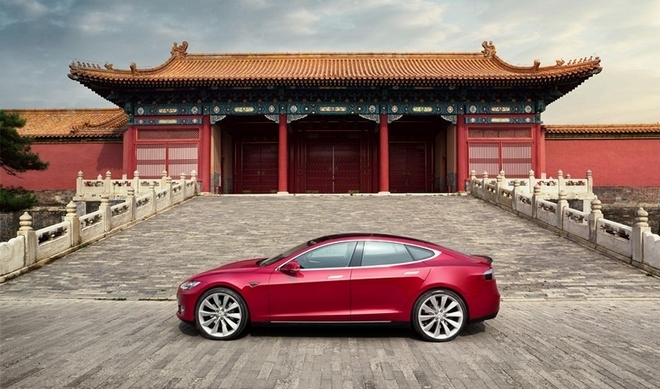
A Tesla Model S. Photo: Tesla China
American electric-car manufacturer Tesla is seeking a location and a local partner for a manufacturing facility in China, in a baby step to put into practice Elon Musk's blueprint to localize manufacturing in the lucrative market in three years.
Recently, Zhu Xiaotong, general manager of Tesla China, confirmed to jiemian.com, a Chinese business news portal, that the process of the company's localization in China had just entered the phase of plant location selection.
"We are still at a very primary stage, given the fact that vehicle manufacturing is a very complicated thing. Therefore, we are very cautious about choosing (a plant location and a local partner in China)," said Zhu, revealing that the company will first produce components and parts in China in order to reduce risks to the lowest point.
Previous reports said that executives from Tesla did an inspection tour of Suzhou, an eastern Chinese city near Shanghai, for a possible factory location on March 17-18 after the city's government officials held a special meeting to discuss the feasibility of a project related to the California-based firm on March 13. But no details have been made public yet.
According to the Chinese law, a foreign carmaker has to establish a joint venture with a local carmaker before opening a factory on the Chinese territory.
Zhu said that Tesla has not decided yet whether it wants to establish a partnership in China or whether there is an alternative option.
If Tesla is approved by the authorities to open a factory in China, it can steer clear of the hefty import tax and cut the transportation fees and purchase tax, which in turn makes its premium electric sedans affordable to Chinese consumers.
Reports said that the price of the Tesla Model S sedan, which starts at 718,800 yuan in China, will be cut by 230,000-300,000 yuan by producing locally.
As China has invested 37 billion yuan in combating air pollution in the past 5 years, the establishment of a Tesla factory in the country will give the American company access to government subsidies and incentives for electric-car manufacturers. The Chinese government has been promoting the use of new-energy vehicles and has set a target of 5 million new-energy vehicles by 2020.
As for Beijing, potential all-electric-car buyers have been excluded from the lottery, which is held by the local government once every two months, to limit the number of applicants who want to buy a car in the capital that is notorious as the "city of smog".
A factory is not enough to promote sales
In the first three quarters of 2015, Tesla sold 3,025 electric cars in the Chinese mainland, according to Musk. One of the key factors behind the weak sales is what the CEO called public misunderstanding about charging.
In an article published on its Chinese official website, Tesla said that it has set up more than 340 superchargers in about 50 Chinese cities and over 1,600 destination chargers in some 100 Chinese cities. In 2015, the charging-solutions provider extended the coverage of its superchargers to Harbin city and Guangdong province.
Some industry insiders have said that Tesla's exploration of the Chinese market will face major roadblocks. The biggest one is the current infrastructure level that is too limited to raise the popularity of electric cars in China. The fact is that a majority of Chinese families, who live in densely populated areas, do not possess private garage, making it difficult to have chargers installed independently and privately.
At the annual session of the Chinese People's Political Consultative Conference (CPPCC) held in March, Liu Zhenya, chairman of State Grid, the largest state-owned power distributor in China, said that he was pessimistic about the prospects of Tesla in China. Liu pointed out that a major obstacle for Tesla's effort in expanding its charging network in China was the country's new industrial policy, which took effect on January 1, 2016 and set national standards for the compatibility of charging ports and communication protocols.
The State Grid chairman criticized Tesla for its unilateral move of building its own charging network based on its own standards, saying it will "isolate itself" in China.
"State Grid sets the national standards on behalf of the Chinese government…I hope that the company (Tesla) could correct the shortcomings to become a good company (in China)," said Liu.
According to reports, talks between Tesla and State Grid about the construction of charging networks are not going smooth.
In the article, Tesla vowed to positively contribute to the implementation of China's national standards set for charging and to do more to make its charging devices compatible with the standards.
In a recent interview, Zhu dismissed reports that Tesla cut the 2016 sales target to 5,000 cars from 10,000 cars as "nonsense", saying that his own goal is to surpass the 10,000 mark.
| Touched | Sympathetic | Bored | Angry | Amused | Sad | Happy | No comment |